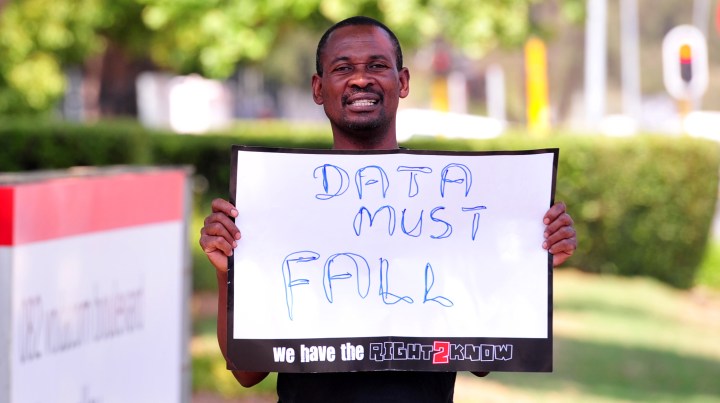DATA SERVICES MARKET INQUIRY
Competition Commission: Mobile data market is anti-poor

Mobile data is more expensive in South Africa than comparative countries and the market lacks transparency and is anti-poor, said the Competition Commission on Wednesday.
The local market for mobile data services is skewed against low-income earners who are effectively charged more by network operators and have little access to Wi-Fi alternatives, the Competition Commission argues in its provisional report on the Data Services Market Inquiry.
The report says the data market includes “anti-poor pricing structures” as prepaid costs are significantly higher than postpaid deals and consumers are charged more for smaller bundles of data.
Competition Commissioner Tembinkosi Bonakele released the provisional report in Pretoria on Wednesday 24 April 2019. The Data Services Market Inquiry was launched in 2017 after the #DataMustFall campaign called for reduced data costs.
“An assessment of headline retail prices of all mobile operators demonstrates that consumers of small data bundles, generally being poorer consumers, pay inexplicably more on a per MB/GB basis,” reads the report.
“For instance, relative to a 1GB data bundle, a consumer buying a 100MB data bundle will pay roughly twice the price on a per MB basis for the same data-period validity. A consumer buying a 50MB bundle will pay up to three times more and a 20MB bundle up to four times more.”
The Competition Commission dismissed the argument from network operators that short-term data packages and promotions offered to low-income users lessen the gap between what they pay versus high-income earners.
The effect is that poor South Africans have less connectivity while it is rising in other sectors of society.
“Whilst usage amongst post-paid subscribers is growing materially, usage for pre-paid subscribers is relatively flat by comparison. This suggests that pricing is limiting the ability of lower-income subscribers to make greater use of data services, which in turn restricts the benefits of the digital economy to this class of consumer,” reads the report.
Bonakele said data prices in South Africa are high when benchmarked globally and compare poorly to other SADC and BRICS countries. He said the market’s two dominant players, Vodacom and MTN, charge higher prices in South Africa than the other countries where they operate.
The provisional report describes a market with insufficient competition between network providers. Cell C and Telkom Mobile have tried to challenge the dominance of Vodacom and MTN by setting lower data costs.
It hasn’t resulted in significantly lower prices or reduced market share for Vodacom or MTN.
Due to their large subscriber base, MTN and Vodacom are able to pay for the infrastructure to provide wide and high-quality network coverage while the challengers can’t meet the same levels of capital expenditure, limiting their ability to attract new subscribers.
“This permits the larger networks to be less responsive on price and maintain higher levels of profitability, perpetuating the cycle of higher levels of infrastructure expenditure. It also softens price competition from the challenger networks as aggressive price declines may become financially unsustainable, especially considering the need to still fund investment in infrastructure,” the report notes.
The report makes recommendations for immediate and long-term relief on data pricing.
It calls on network providers to voluntarily reduce the price of data bundles below 1GB to “an objectively justifiable and socially defensible range”, which it suggests could be 25% higher. It also wants networks to lower the headline costs offered to consumers to include things like promotions and free data offerings in order to increase transparency.
If the networks don’t take up the suggestions, the report recommends regulators step in and impose new legislation or regulations.
The long-awaited release of high-demand spectrum, repeatedly delayed by the government, has also raised data costs. The Competition Commission urged for it to be released urgently, with any spectrum assignment release being contingent on reducing data costs.
The relationship between dominant network providers and challengers who enter into wholesale agreements with them to provide broader coverage across the country could also be set to change.
“To enhance price-based competition, the Commission recommends more regulatory scrutiny and potentially action at the wholesale level of the industry in the event that there are no voluntary commitments to improve wholesale access,” the report recommends.
Finally, the report notes the need to develop fixed-line alternatives to data. Due to the legacy of apartheid, the rollout of fibre networks has largely been restricted to wealthier areas, and while some municipalities offer free public Wi-Fi, it remains insufficient. This leaves low-income consumers with no alternative to expensive data packages.
“Alternative infrastructure must be developed, particularly to provide data services in lower income areas and smaller secondary cities and towns,” reads the report.
Stakeholders have until 14 June 2019 to comment on the provisional report. Bonakele said the final report will be published later in the year. DM



















 Become an Insider
Become an Insider